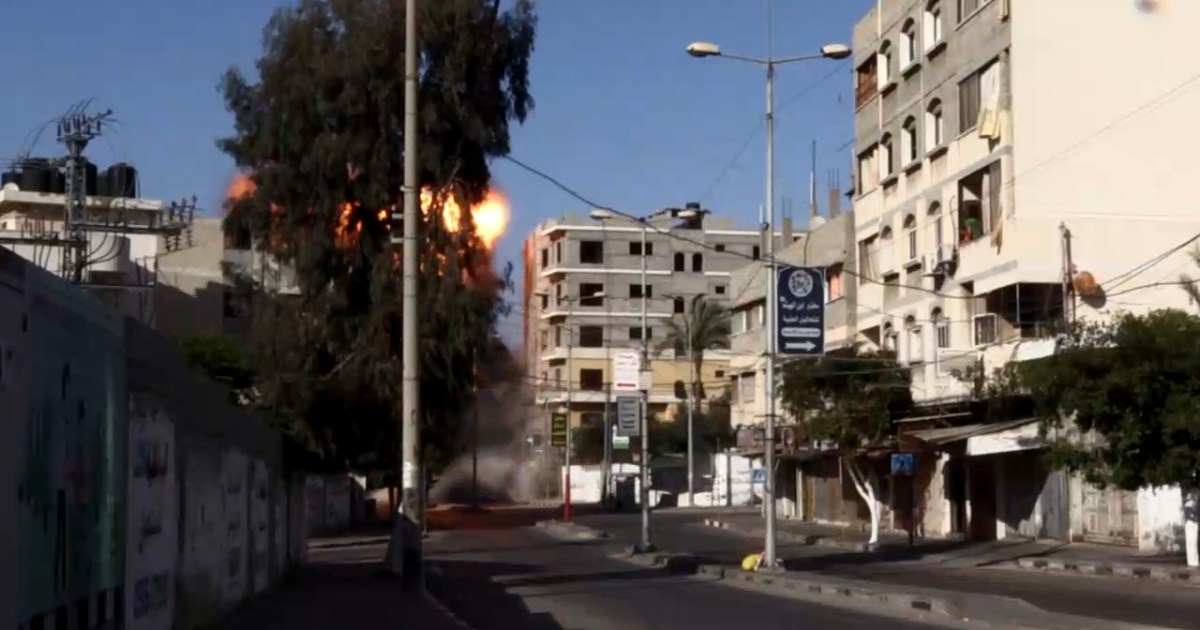In a flash, Abu al-Amir and his family of 10 have become in a “blowing wind” after losing his only source of livelihood as he worked as a guard at the Sunrise Tower, which an Israeli air strike turned into a “pile of rubble”.
Many, like Abu al-Amir, who obtain their livelihoods from occupations related to daily work and are called "day laborers", have joined the "unemployment army" in Gaza, whether as a result of the destruction of the places in which they work, or because the wheel of life in Gaza has stopped since the outbreak of the current Israeli war. Last Monday evening.
Workers ... victims without blood
Abu al-Amir told Al-Jazeera Net that he has been working in the tower for 13 years, supporting a large family of 10, and by his collapse before his eyes, he suffered a lot of pain and heartbreak.
Abu al-Amir, whose sons Amir (12 years old) and Muhammad (10 years old) were killed in an Israeli air strike during the 2014 war, adds, "I felt that I lost a third son with the collapse of the tower, which was my only source of livelihood."
And Al-Shorouk Tower is the oldest towers built in Gaza after the establishment of the Palestinian Authority in 1994, it is the second in terms of height, and it is a famous landmark in the most vibrant commercial district of the city in the city, and it is a commercial tower that contains commercial companies' headquarters, media and press offices, medical clinics and other sectors. Commercial and service.
The raging Israeli war on Gaza since last Monday has halted the fragile economy, mainly due to restrictions and the long years of Israeli blockade since mid-2007.
Nael Al-Shabti told Al-Jazeera Net that he, his brother and other workers working with him in the construction sector have been without work since the outbreak of the war.
Al-Shabati fears that the war will be prolonged and with it their inability to work, from which many families subsist.
Heavy losses
As a result of the massive air strikes, severe damage was inflicted on most of the commercial and economic sectors, which will have negative impacts on the lives of two million people in the small coastal sector, who already suffer from high rates of poverty and unemployment.
Official authorities in Gaza say that the Israeli destruction has affected hundreds of economic and commercial establishments, including banks and corporate headquarters, estimating the initial direct losses due to the destruction caused by the war at more than $ 100 million.
Massive damage was caused to about 60 government offices and more than 500 housing units, according to preliminary estimates by the Government Media Office in Gaza.
Economic paralysis
Dr. Osama Nofal, Director of Planning and Public Policies at the Ministry of Economy in Gaza, told Al-Jazeera Net that the economy is the most affected by the war, which has multiplied its damage and exacerbated the tragic conditions of the population.
He added that targeting towers, shops, commercial companies ’headquarters and the infrastructure has an“ economic dimension, ”as the destruction that is inflicted on them affects the productivity of all economic sectors, in addition to the suspension of the financial and banking system due to the bombing of bank headquarters and their out of work, all of which leads to an irregularity in the economic process.
Also, the atmosphere of terror that hangs over the Gaza Strip since the outbreak of the war has caused the "paralysis" of the commercial economic movement, and the business cycle and economic activity are in a state of collapse, according to Nofal.
He said that vulnerable groups and informal employment (the daily-workers) are the most affected by this collapse, and then the unemployment rate will rise and lead to a greater rise in the level of poverty.
It is expected, according to Nofal, that unemployment will rise from 49% before the war to 70% after the war, and the poverty rate will reach 85%, and these dangerous rates require rapid regional and international interventions through the formation of relief and reconstruction funds to prevent total collapse.
Nofal says that what makes the reality worse is that the war broke out and the economy sector, which suffered during the 2014 war, losses estimated at $ 500 million, only 7% of which was compensated, and this adds to the economic crises.

